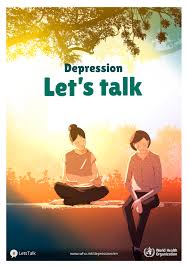Let’s talk about depression!.
As per a recent study by the WHO, nearly 4.4 per cent of the world population is suffering from a ‘common mental disorder’ — which is known as ‘Depression.’ In India, the burden is equally alarming. According to the National Crime Records Bureau (NCRB) data for 2023, 1,70,924 Indians died by suicide in that year alone — roughly translating to over 460 deaths per day.
The numbers are significantly higher when suicide attempts are considered, most of which go unreported. Further, a post-pandemic mental health survey revealed that the prevalence rate of depression in India stands at approximately 4.5 per cent, accounting for over 57 million cases. Additionally, as per UNICEF’s 2021 report (still cited widely in 2025 due to its foundational impact), it was found that 1 in 7 adolescents aged 15 to 24 years reported feeling depressed or having little interest in doing daily activities — a trend that experts believe may persist for years without effective intervention.
A person suffering from depression would never accept his/her condition in the first place, because the majority of us do not believe that it exists. One of the hardest things for people to understand about depression is that it cannot be seen visually, as the pain is very deep within, subtle, and not visible. This lack of visual impairment makes depression difficult to deal with and identify by both those suffering from it and those around them. Due to our double standards, we fail to understand the fact that someone who looks completely normal from the outside could be going through absolute hell and experiencing meltdown within.
There are umpteen reasons in the world for a person to get depressed. Some feel depressed because their efforts to achieve something have ended in utter failure; some may feel disappointed and low-spirited because they think that they have been let down by those from whom they expected help or support; some others feel that they have been left alone and that no one loves them or cares for them. There are also many such people who feel that society has no useful role for them, whereas others feel frustrated to find that there are hurdles all the way in this vitiated social set-up. The pressure of these thoughts is so severe that in some cases a person may feel that life has become an unbearable burden for him/her and is, therefore, not worth living. It is quite common to talk about lingering stress or tension as silent killers or major causes of crime and psychosomatic diseases.
But a look around on a quick count gives us the impression that it is depression which is more disastrous and fatal for humanity, because in the current scenario, it is not only a cause for the major addictions among people in society but it is also the reason for the breakdown of family life, rise in crime graph, and even the high rate of population growth across the world. When one feels that quite a large number of people in this age are congenitally selfish, transparently exploitative, and cruelly competitive and jealous, and that there is an utter lack of sympathy or fellow-feeling in the social environment, one feels deeply depressed. The behaviour of even those who are not visibly depressed may have been influenced directly or indirectly by an undercurrent of depression as it gripped them earlier today or yesterday, or a few days ago. Successful medical experiments over the years have proved ‘meditation’ to be an effective tool for curing chronic cases of depression. A society, which consists of a very large number of tense and depressed people, would certainly march towards gloom and doom if it does not use this remedy, which is psychological, biological, and spiritual.
As a part of society, each one of us can play a constructive role to help such people by empathising with them and just standing by their side and letting them know that we are there and will go out of our way to fight their battle against depression. Let them know that you do not and will not think any differently of them because of their illness. Remember — it may not be possible to visually identify that someone has depression, but it is important to think about their normal behaviour, and if they are acting differently, then you should encourage them to see a doctor. So let us all come together to break down the stigma around depression so that we do not see it claim any more lives of our brothers and sisters.
